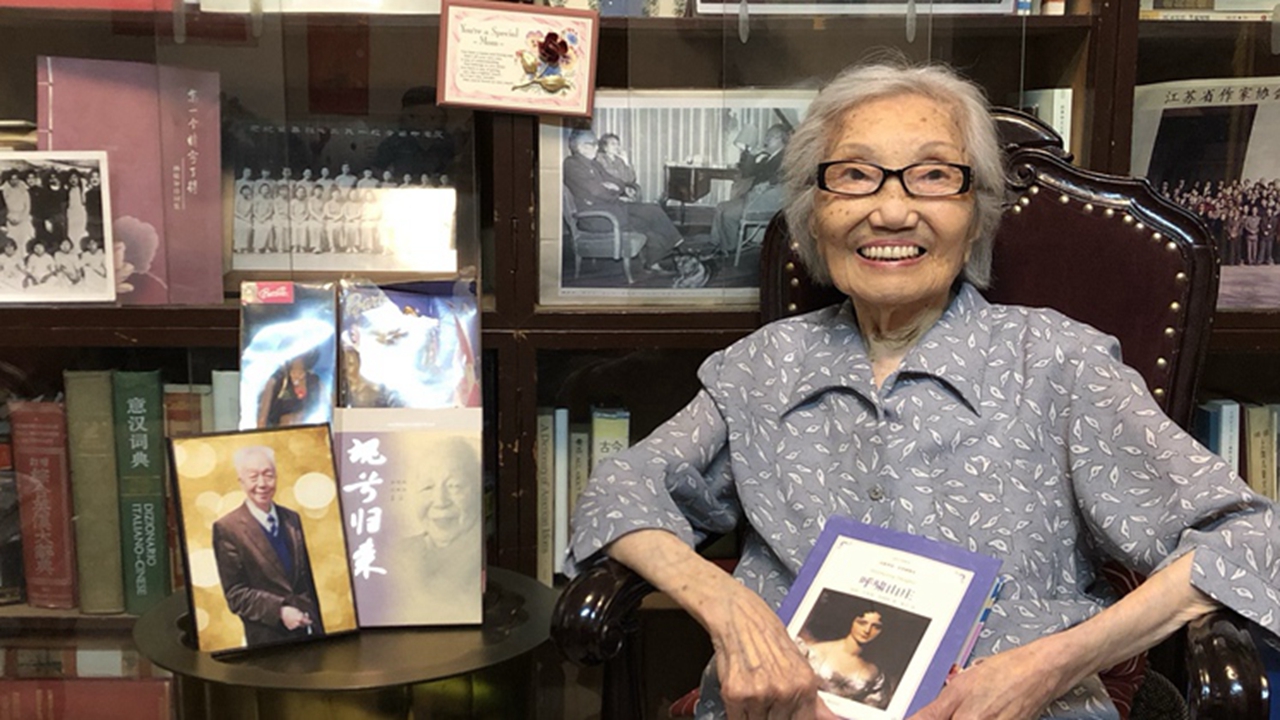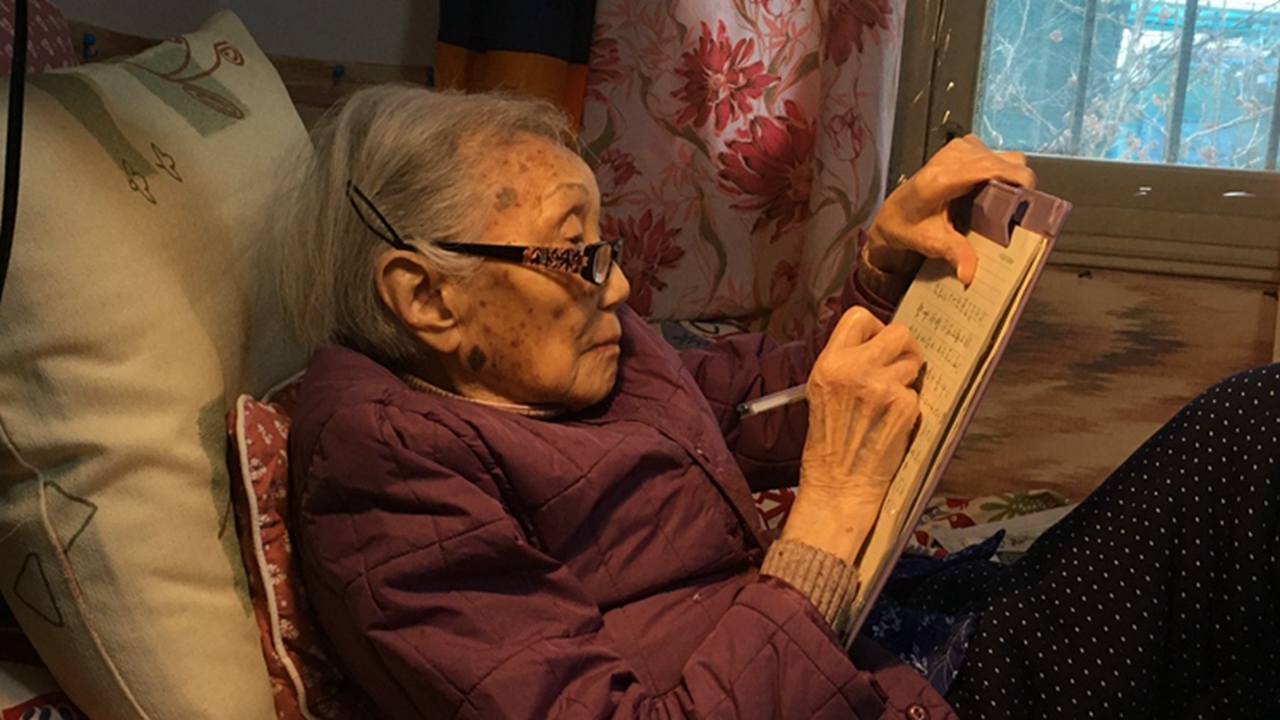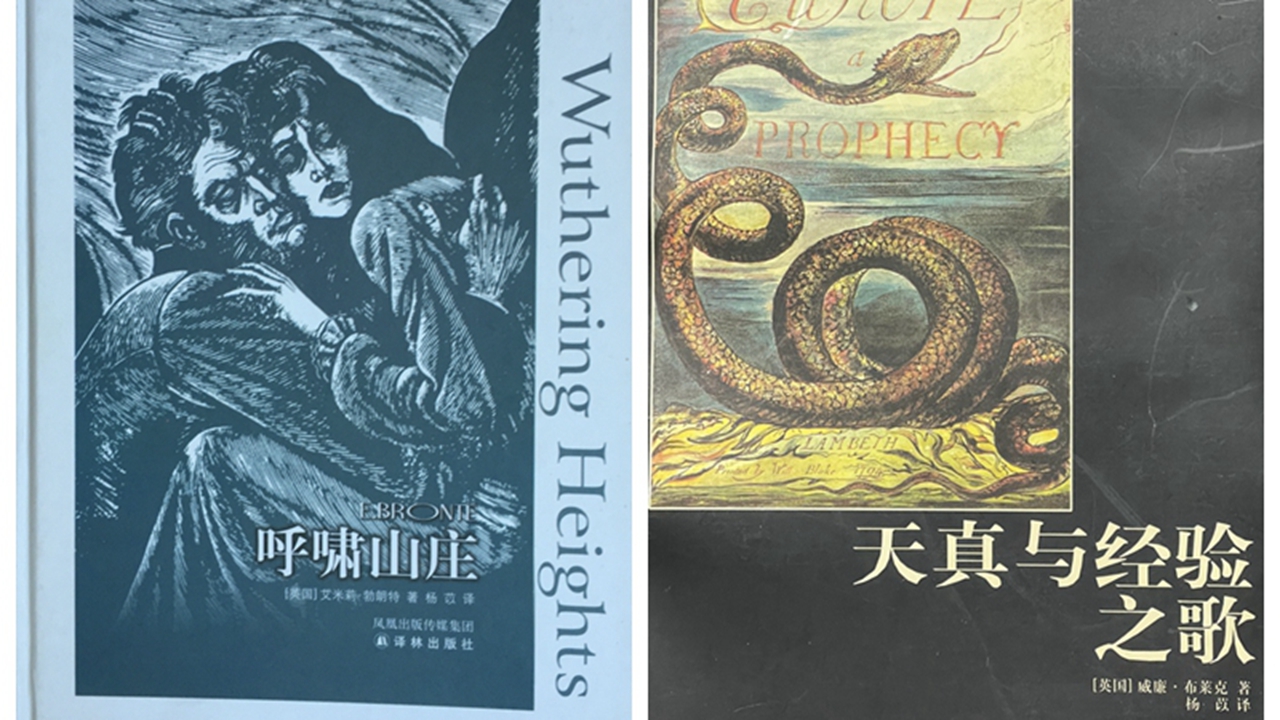In loving memory of Aunt Yang Yi on the first anniversary of her passing
Writer: Alfred Che | Editor: Zhang Zeling | From: Original | Updated: 2024-03-05

Yang Yi (R) and Alfred Che in a file photo. Photos by courtesy of the writer
Editor's note: Yang Yi (1919-2023) was a renowned literary figure and translator. Her notable translations include the Chinese version of "Wuthering Heights" and "Songs of Innocence and Experience." She also penned numerous original works that were translated into multiple languages and published internationally, greatly influencing the development of contemporary Chinese literature.
This article, written in January of this year, commemorates the first anniversary of Yang's passing.

Yang Yi in her later years.
Part I
Time flies, and it has been a whole year since Aunt Yang Yi left us. Although I only had the pleasure of meeting her once, her memory remains vivid in my mind. Her crystal-clear eyes, shining with wisdom, are like bright lights that will never die out, still watching over us warmly.
I first met Aunt Yang's youngest daughter, Zhao Heng, at activities organized for the offspring of the National Southwest Associated University, known as "Lianda" – an alliance by Peking University, Tsinghua University and Nankai University in Kunming during China's War of Resistance Against Japanese Aggression. We later developed a close bond through our frequent encounters.
My love for English literature led me to admire Yang Yi, a well-known litterateur and translator of "Wuthering Heights." I had always hoped to visit her, and when the opportunity arose during a business trip to Nanjing in mid-August 2019, I expressed my intention to Zhao. To my pleasant surprise, she not only agreed immediately but also made enthusiastic arrangements. She requested that I refrain from bringing flowers, as their home already received numerous floral gifts.

A photo of Yang Yi and Ba Jin sit together.
I had prepared a copy of "Tales of Danish Zero-Carbon Life" (of which I was the creative director) for Aunt Yang, but with her 100th birthday approaching, I felt compelled to bring a more personal gift. The day before the visit, on a whim, I decided to create a piece of calligraphy for her. I sought the help of my talented friend, Xiao Ma, who suggested using a phrase that Ba Jin once presented to Bing Xin (both of them were among the most respected writers in China): "With you being around, the lights are still on." Ba Jin had been the spiritual leader of Aunt Yang's generation in the literary world since she was young. She corresponded with Ba Jin from the age of 17, and enjoyed lifelong friendship with him, always regarding him as her mentor. It would not be more fitting to write this sentence for my calligraphy!
Despite being in Nanjing, I was able to gather the necessary materials for my calligraphy with the assistance of my childhood friend, Wu Yue. Wu, who now lives in Nanjing, majored in fine arts in college and has been working in the creative and advertising industry after graduation. He has provided brand designs for many well-known institutions and corporations, including the Nanjing Massacre Memorial Hall.
Wu's living room became my temporary studio on the day of the visit, with him assisting with the necessary preparations. With my basic calligraphy skills, I was able to complete the piece. Wu even created a seal for me to add the finishing touch to my birthday gift for Aunt Yang.

Yang Yi works in her study room.
Part II
On August 17, 2019, we drove to Beijing West Road under the hot morning sun, navigating the alleys until we reached the old residential community in Nanjing University. After a few twists and turns, I finally laid eyes on the long-awaited "Mother's Courtyard" that Zhao often spoke about. Having seen the place numerous times in Zhao's articles and paintings, it felt familiar and welcoming as we arrived. The three-bedroom unit on the first floor of a three-story building was built in the 1960s and was nestled behind lush greenery, including a pomegranate tree.
We were greeted at the door by Xiao Chen, a nanny who had cared for Aunt Yang for many years. She informed us that Aunt Yang was waiting in the back room and would be out soon. The small living room, filled with books, old photos, calligraphy, and paintings, exuded an elegant and unique humanistic atmosphere and aesthetic taste. Aunt Yang, who emerged from the back room with a three-sided walker, appeared lively and sharp despite her age.
I couldn't help but be captivated by Aunt Yang's unusually bright and sharp eyes. She welcomed us with a generous smile, drawing us in immediately. As we exchanged greetings and reminisced about Lianda stories, Aunt Yang's memory proved to be as sharp as ever. Despite the passage of three quarters of a century and numerous challenging events, she retained clear-cut impressions of her peers and predecessors from Lianda.
After we all took our seats, we briefly exchanged greetings, and the conversation quickly turned to past Lianda stories. My father, Che Ming, was admitted to Lianda's history department in Kunming in 1944, several years after Aunt Yang. After the War of Resistance Against Japanese Aggression, he went to Beijing in 1945 and graduated from Peking University in 1948. As I shared anecdotes about people from Lianda that I had heard from my father as a child, Aunt Yang remembered them all clearly, her memory as sharp as ever. When she learned that both Wu Yue and I had grown up in Kunming, she reminisced about many pleasant memories. Three-quarters of a century have passed with vicissitudes of events experienced by her predecessors and peers from Lianda, and she has maintained a clear-cut impression of them.
Amongst the lively conversation and laughter, we could feel the calm and broad perspective possessed by someone who had truly experienced a lot in life, having lived through various extreme situations over the past century.
Aunt Yang showed great interest as I spoke about the intricate story behind the "History of National Associated Southwest University" in the "Contemporary China" book series, which my father had been asked to write. When I mentioned the differing evaluations of Lianda's esteemed leader, President Mei Yiqi, both domestically and overseas at the time, Aunt Yang's eyes lit up. She then became serious and stated firmly, "President Mei should be given a State funeral."
Later, as we ventured into the back room to admire the porcelain figures and souvenirs, as well as the animal figures on the living room sofa, we inquired about her favorite animal. She responded with a girlish, innocent smile.

The young Yang Yi.
Throughout our time with Aunt Yang, she displayed sharp thinking, quick wit, and a good sense of humor, showing no sign of aging. Before we knew it, an hour had passed. Reluctantly, we began to prepare to leave, and I presented her with the book and calligraphy I had brought. She was particularly fascinated by the "Danish Green Fairytale" and was thrilled to receive the calligraphy I wrote, "With you being around, the lights are still on," and took photos with us. After wishing her well, we bid Aunt Yang farewell with a hug.
Zhao later informed me that Aunt Yang appreciated my calligraphy and praised its excellent meaning. After we departed, Aunt Yang asked her to find a prominent place in the living room to hang the artwork. She chose the black cabinet door, where a silk banner presented to her by Yilin Translation Publishing House to celebrate her 100th birthday was displayed. From that day on, my calligraphy covered the banner until Aunt Yang was hospitalized in late December 2022 due to COVID and never returned home.
Part III
In remembrance of the one-year anniversary of Aunt Yang Yi's passing, I have written this humble article as a tribute to the memory of this beloved lady of the century.

Works by Yang Yi.